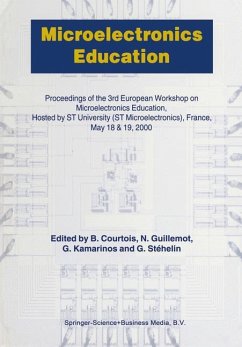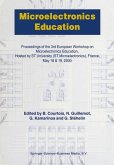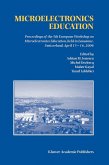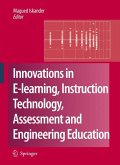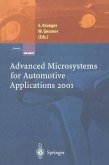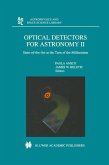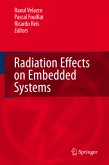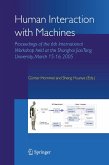Microelectronics Education
Proceedings of the 3rd European Workshop on Microelectronics Education
Herausgegeben:Courtois, B.; Guillemot, N.; Kamarinos, G.; Stéhelin, G.
Microelectronics Education
Proceedings of the 3rd European Workshop on Microelectronics Education
Herausgegeben:Courtois, B.; Guillemot, N.; Kamarinos, G.; Stéhelin, G.
- Broschiertes Buch
- Merkliste
- Auf die Merkliste
- Bewerten Bewerten
- Teilen
- Produkt teilen
- Produkterinnerung
- Produkterinnerung
This is the third edition of the European Workshop on Microelectronics Education (EWME). A steady-state regime has now been reached. An international community of university teachers is constituted; they exchange their experience and their pedagogical tools. They discuss the best ways to transfer the rapidly changing techniques to their students, and to introduce them to the new physical and mathematical concepts and models for the innovative techniques, devices, circuits and design methods. The number of abstracts submitted to EWME 2000 (about one hundred) enabled the scientific committee to…mehr
Andere Kunden interessierten sich auch für
![Microelectronics Education Microelectronics Education]() CourtoisMicroelectronics Education121,99 €
CourtoisMicroelectronics Education121,99 €![Microelectronics Education Microelectronics Education]() Adrian M. Ionescu / Michel Declercq / Maher Kayal / Yusuf Leblebici (eds.)Microelectronics Education53,49 €
Adrian M. Ionescu / Michel Declercq / Maher Kayal / Yusuf Leblebici (eds.)Microelectronics Education53,49 €![Innovations in E-learning, Instruction Technology, Assessment and Engineering Education Innovations in E-learning, Instruction Technology, Assessment and Engineering Education]() Innovations in E-learning, Instruction Technology, Assessment and Engineering Education79,99 €
Innovations in E-learning, Instruction Technology, Assessment and Engineering Education79,99 €![Advanced Microsystems for Automotive Applications 2001 Advanced Microsystems for Automotive Applications 2001]() Advanced Microsystems for Automotive Applications 200140,99 €
Advanced Microsystems for Automotive Applications 200140,99 €![Optical Detectors For Astronomy II Optical Detectors For Astronomy II]() Optical Detectors For Astronomy II116,99 €
Optical Detectors For Astronomy II116,99 €![Radiation Effects on Embedded Systems Radiation Effects on Embedded Systems]() Radiation Effects on Embedded Systems116,99 €
Radiation Effects on Embedded Systems116,99 €![Human Interaction with Machines Human Interaction with Machines]() G. Hommel / S. Huanye (eds.)Human Interaction with Machines120,99 €
G. Hommel / S. Huanye (eds.)Human Interaction with Machines120,99 €-
-
-
This is the third edition of the European Workshop on Microelectronics Education (EWME). A steady-state regime has now been reached. An international community of university teachers is constituted; they exchange their experience and their pedagogical tools. They discuss the best ways to transfer the rapidly changing techniques to their students, and to introduce them to the new physical and mathematical concepts and models for the innovative techniques, devices, circuits and design methods. The number of abstracts submitted to EWME 2000 (about one hundred) enabled the scientific committee to proceed to a clear selection. EWME is a European meeting. Indeed, authors from 20 different European countries contribute to this volume. Nevertheless, the participation of authors from Brazil, Canada, China, New Zealand, and USA, shows that the workshop gradually attains an international dimension. th The 20 century can be characterized as the "century of electron". The electron, as an elementary particle, was discovered by J.J. Thomson in 1897, and was rapidly used to transfer energy and information. Thanks to electron, universe and micro-cosmos could be explored. Electron became the omnipotent and omnipresent, almost immaterial, angel of our W orId. This was made possible thanks to electronics and, for the last 30 years, to microelectronics. Microelectronics not only modified and even radically transformed the industrial and the every-day landscapes, but it also led to the so-called "information revolution" with which begins the 21 st century.
Produktdetails
- Produktdetails
- Verlag: Springer / Springer Netherlands
- Artikelnr. des Verlages: 978-90-481-5518-7
- Softcover reprint of hardcover 1st ed. 2000
- Seitenzahl: 336
- Erscheinungstermin: 4. Dezember 2010
- Englisch
- Abmessung: 244mm x 170mm x 19mm
- Gewicht: 582g
- ISBN-13: 9789048155187
- ISBN-10: 9048155185
- Artikelnr.: 32108173
- Herstellerkennzeichnung Die Herstellerinformationen sind derzeit nicht verfügbar.
- Verlag: Springer / Springer Netherlands
- Artikelnr. des Verlages: 978-90-481-5518-7
- Softcover reprint of hardcover 1st ed. 2000
- Seitenzahl: 336
- Erscheinungstermin: 4. Dezember 2010
- Englisch
- Abmessung: 244mm x 170mm x 19mm
- Gewicht: 582g
- ISBN-13: 9789048155187
- ISBN-10: 9048155185
- Artikelnr.: 32108173
- Herstellerkennzeichnung Die Herstellerinformationen sind derzeit nicht verfügbar.
Oral Presentations.- Enhancing system-level education with reusable designs.- Demands on microelectronics education and research in the Post-PC era.- On the design of microelectronic design projects to fulfill given learning objectives.- System-on-Chip design and its transfer to microelectronics education.- Best practices from 100 corporate universities world-wide.- Quality labelling for electronic training courses.- System LSI design methodology training in Hitachi Ltd.- A university network for the silicon industry.- Educational multimedia and microelectronics: should we think first about the conditions of use ?.- The use of streaming multi-media in microelectronic education.- Distributed VLSI design education using MOCA: the Multimedia On-line Collaboration Architecture.- The MEDEA EDA roadmap, and how it should influence microelectronics education.- The MOSIS Service: IC prototyping and educational program.- Achievements and advances at CMP.- The EUROPRACTICE IC Service offers a new approach to deep submicron design.- Women in engineering in Europe.- Roles and prospects of IDEC activities for the promotion of integrated systems education in Korea.- The specific challenges of electronics and IT education in New Zealand.- Situation and developing trend of microelectronics education in China.- Computer simulations of microdevices and microsystems: gaining insights by visualizing physical concepts.- Teaching modules for a class in Mechatronics.- Multimedia CD-ROM: "An Introduction to the world of microsystems".- Poster Sessions.- Action-based learning system for teaching digital electronics and test.- MEDICIS: an environment for remote FPGA circuit testing by Internet.- WEB based exercises on computer arithmetic.- Distance interactive microelectronics technologycourse: a tool to make easier the understanding and the learning.- TRANSTEC - online training for innovative micro-fabrication techniques.- The role of CAL/CBT tools in microelectronics education.- Geographically distributed teaching laboratory for microelectronic design and testing.- Multimedia tool for self-learning VHDL.- Using multimedia in a digital design lab.- Memphis, a hypermedia system for learning microelectronics.- Hypermedia applications as interactive database resources.- Chips on the Net: an FPGA prototyping platform.- Web based tutorials for teaching electronics.- A web application experience in electronic education in the engineering syllabus.- Basic microelectronics self instructor.- MREL: MetaRegister of Expert Links.- EuroPractice training - a Pan-European infrastructure for microelectronics training.- An experimental approach to the study of semiconductor laser sources.- Laboratory of microelectronics: an advanced practical course on analog ICs design.- A World Wide Web teaching and learning environment applied to educational courses in microelectronics.- FPGA and DSP based programmable system used for educational purposes.- Training of new experts for electronics at the BSU.- Application-oriented microelectronics education.- Interactive logic design on the world wide web.- Mixed-signal testing at the ASIC design course at Twente University.- Multidisciplinary DSP-based control project.- Introducing GSM basic circuits principles.- Improving student assessment in electronics: open exams.- A proposal of the curriculum concerning the information engineering for microelectronics and computer industries.- A graduate program in integrated communication systems.- Concepts for teaching new circuit techniques.- Managing microelectronics education forthe future and tackling the information overflow.- A case study in VLSI design for communications: design of a pipelined adaptive DFE for GMSK over indoor radio channels.- Towards a reusable SoC design methodology.- Design in microelectronics & computer engineering: teaching undergraduates.- Mixed-signal test training at CRTC.- Multidisciplinary collaborative design course for system-on-a-chip (SOC).- Introducing digital circuits design and formal verification concurrently.- Design of the Hadamard Coprocessor with the Alliance CAD system carried by post-graduating students.- Microsystem project-oriented education.- A new trial on HDL exercice class for undergraduate school in EE Department.- Providing flexible interne infrastructure for FPGA-based CAD courses.- PICO - a model microprocessor framework for architecture education.- A Java-based framework for simulation and teaching: HADES - the Hamburg Design System.- Design of analog integrated circuits: freeware PC-based CAD for student practices.- CMP experience on deep sub-micron design-methodology support and transfer.- An introduction to microsystems fabrication.- Experimental and analytical methods for ESD phenomena and their failure analysis in CMOS IC's.- Electronics manufacturing learning factory.- Physics of semiconductor devices: a 2D simulation training course.
Oral Presentations.- Enhancing system-level education with reusable designs.- Demands on microelectronics education and research in the Post-PC era.- On the design of microelectronic design projects to fulfill given learning objectives.- System-on-Chip design and its transfer to microelectronics education.- Best practices from 100 corporate universities world-wide.- Quality labelling for electronic training courses.- System LSI design methodology training in Hitachi Ltd.- A university network for the silicon industry.- Educational multimedia and microelectronics: should we think first about the conditions of use ?.- The use of streaming multi-media in microelectronic education.- Distributed VLSI design education using MOCA: the Multimedia On-line Collaboration Architecture.- The MEDEA EDA roadmap, and how it should influence microelectronics education.- The MOSIS Service: IC prototyping and educational program.- Achievements and advances at CMP.- The EUROPRACTICE IC Service offers a new approach to deep submicron design.- Women in engineering in Europe.- Roles and prospects of IDEC activities for the promotion of integrated systems education in Korea.- The specific challenges of electronics and IT education in New Zealand.- Situation and developing trend of microelectronics education in China.- Computer simulations of microdevices and microsystems: gaining insights by visualizing physical concepts.- Teaching modules for a class in Mechatronics.- Multimedia CD-ROM: "An Introduction to the world of microsystems".- Poster Sessions.- Action-based learning system for teaching digital electronics and test.- MEDICIS: an environment for remote FPGA circuit testing by Internet.- WEB based exercises on computer arithmetic.- Distance interactive microelectronics technologycourse: a tool to make easier the understanding and the learning.- TRANSTEC - online training for innovative micro-fabrication techniques.- The role of CAL/CBT tools in microelectronics education.- Geographically distributed teaching laboratory for microelectronic design and testing.- Multimedia tool for self-learning VHDL.- Using multimedia in a digital design lab.- Memphis, a hypermedia system for learning microelectronics.- Hypermedia applications as interactive database resources.- Chips on the Net: an FPGA prototyping platform.- Web based tutorials for teaching electronics.- A web application experience in electronic education in the engineering syllabus.- Basic microelectronics self instructor.- MREL: MetaRegister of Expert Links.- EuroPractice training - a Pan-European infrastructure for microelectronics training.- An experimental approach to the study of semiconductor laser sources.- Laboratory of microelectronics: an advanced practical course on analog ICs design.- A World Wide Web teaching and learning environment applied to educational courses in microelectronics.- FPGA and DSP based programmable system used for educational purposes.- Training of new experts for electronics at the BSU.- Application-oriented microelectronics education.- Interactive logic design on the world wide web.- Mixed-signal testing at the ASIC design course at Twente University.- Multidisciplinary DSP-based control project.- Introducing GSM basic circuits principles.- Improving student assessment in electronics: open exams.- A proposal of the curriculum concerning the information engineering for microelectronics and computer industries.- A graduate program in integrated communication systems.- Concepts for teaching new circuit techniques.- Managing microelectronics education forthe future and tackling the information overflow.- A case study in VLSI design for communications: design of a pipelined adaptive DFE for GMSK over indoor radio channels.- Towards a reusable SoC design methodology.- Design in microelectronics & computer engineering: teaching undergraduates.- Mixed-signal test training at CRTC.- Multidisciplinary collaborative design course for system-on-a-chip (SOC).- Introducing digital circuits design and formal verification concurrently.- Design of the Hadamard Coprocessor with the Alliance CAD system carried by post-graduating students.- Microsystem project-oriented education.- A new trial on HDL exercice class for undergraduate school in EE Department.- Providing flexible interne infrastructure for FPGA-based CAD courses.- PICO - a model microprocessor framework for architecture education.- A Java-based framework for simulation and teaching: HADES - the Hamburg Design System.- Design of analog integrated circuits: freeware PC-based CAD for student practices.- CMP experience on deep sub-micron design-methodology support and transfer.- An introduction to microsystems fabrication.- Experimental and analytical methods for ESD phenomena and their failure analysis in CMOS IC's.- Electronics manufacturing learning factory.- Physics of semiconductor devices: a 2D simulation training course.

